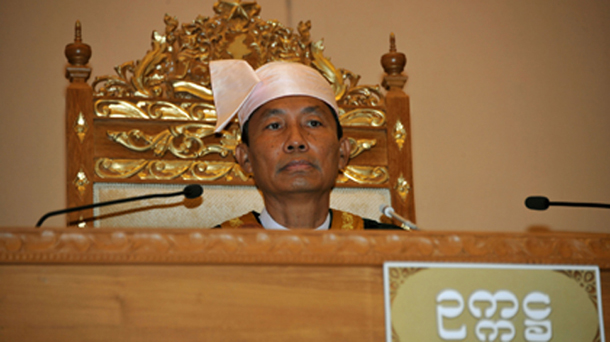RANGOON — President Thein Sein has asked Parliament to discuss public proposals for a new law to restrict interfaith marriages, after receiving a letter from prominent monks showing more than 1 million signatures of support for such a measure.
However, Parliament Speaker Shwe Mann has decided to throw the question back to the president, saying lawmakers will not discuss the matter further until a bill is drafted and considered by relevant government bodies, including the religious affairs ministry, the home affairs ministry and the immigration department of the foreign affairs ministry, as well as the national human rights commission and the union high court.
Shwe Mann, who is chairman of the ruling Union Solidarity and Development Party (USDP), said in a session of Parliament on Thursday morning that he would write a letter to Thein Sein himself, urging the government to take responsibility in the matter.
“He told Parliament that this issue relates to each ministry, and each ministry needs to be involved in writing a draft law that can be proposed for discussion in Parliament. They are kicking this issue back and forth,” Pe Than, a lawmaker for the Rakhine Nationalities Development Party (RNDP), told The Irrawaddy on Thursday afternoon, adding that the usual procedure was for ministries to draft and send bills to Parliament for discussion.
A Buddhist nationalist movement known as 969 is calling for restrictions on interfaith marriage and has collected 1.3 million signatures in support. Leading monks in the movement hired lawyers last year to write their own version of a bill, which, if enacted, would require Buddhist women to get permission from parents and government officials before marrying a man from any other faith. The bill, which has been opposed by human rights activists, also calls for non-Buddhist men to convert to Buddhism before marrying Buddhist women.
“A lot of Buddhist people are afraid their Buddhist religion will disappear if the Muslim population grows. Our Buddhist monks are worried the Muslim population will influence the country,” the RNDP lawmaker Pe Than said.
“Personally, I would not block the bill because we need to protect our race. But it’s important to clarify that we only need to protect our fence, rather than disturbing or offending people of other religions,” he added, referring to concerns that Muslim immigrants from Bangladesh are illegally crossing the border and living in Arakan State, where his constituency is based.
He said protections for race and religion were part of the 2008 Constitution, in the form of a prohibition on polygamy, but that enforcement remained lax and a legal upgrade was needed.
Win Htein, a lawmaker from the National League for Democracy (NLD), declined to comment when asked for his views of restrictions on interfaith marriage. “Issues of race and religion are very dangerous,” he told The Irrawaddy.
“Some ethnic MPs do not like to talk about this issue in Parliament,” he added. While most people in the country are Buddhist, Christianity and Islam are widely practiced by certain ethnic minority groups.
Thein Sein received a letter last year with 1.3 million signatures in support of a bill to restrict interfaith marriage. The letter was sent by the Organization for the Protection of Race, Religion and Belief, a group of senior monks who support the 969 movement. The president asked Parliament earlier this week to discuss the proposal.
The monks are calling for four new laws to “protect race and religion.” In addition to an interfaith marriage law, they are requesting a law for population control, a law to govern religious conversion, and a law to outlaw polygamy.
The 969 movement is led by Wirathu, a controversial monk in Mandalay who has held public sermons around the country urging Buddhists to boycott Muslim-owned businesses. The 969 sermons have been criticized as hate speech, with allegations that they have been linked to outbreaks of Buddhist mob violence against Muslim communities.

















